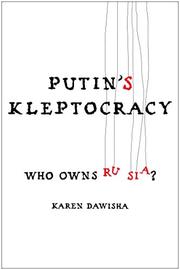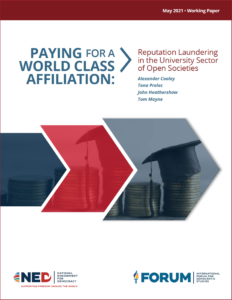President Biden’s democracy promotion agenda includes an anti-corruption strategy with provisions for establishing a kleptocracy asset recovery rewards program to identify illicit funds held in US banks, notes Elizabeth Shackelford, a senior fellow on US foreign policy with the Chicago Council on Global Affairs.
It also calls for safeguarding assistance dollars from inadvertently supporting corrupt actors. This point is essential, she writes. If treated as an afterthought, the role US assistance dollars play in fueling corruption in fragile states across the globe could easily undermine the benefits of the rest.
 Autocracies are not based on the malevolent rule of single individuals but on sophisticated kleptocratic networks intertwined with the economic and security structures of liberal democracies, National Endowment for Democracy (NED) board member Anne Applebaum told the U.S. House Foreign Affairs Committee (above).
Autocracies are not based on the malevolent rule of single individuals but on sophisticated kleptocratic networks intertwined with the economic and security structures of liberal democracies, National Endowment for Democracy (NED) board member Anne Applebaum told the U.S. House Foreign Affairs Committee (above).
Addressing the symbiotic relationship between authoritarianism and corruption will determine who wins the contest between democracy and its illiberal challengers, argue IRI’s deputy director for technical advancement.
It takes a network to defeat a network. In order to elevate the fight against kleptocracy, it is vital that current initiatives to address the enabling environment for kleptocratic abuse in the United States are translated into concerted action with other transit and destination countries, they write for The National Interest:
 This includes promoting the full implementation of existing anti-corruption and anti-money-laundering commitments under international agreements, including the Financial Action Task Force’s most recent recommendations. Washington should coordinate the introduction of Global Magnitsky sanctions targeting human-rights abuses and corruption with other democracies whenever possible….
This includes promoting the full implementation of existing anti-corruption and anti-money-laundering commitments under international agreements, including the Financial Action Task Force’s most recent recommendations. Washington should coordinate the introduction of Global Magnitsky sanctions targeting human-rights abuses and corruption with other democracies whenever possible….- Second, the United States should redouble its efforts to assist consolidating democracies that are penetrated by kleptocratic networks, or are at risk of becoming kleptocracies themselves, in developing a normative and institutional architecture that is conducive to good governance.
- Lastly, a key feature of contemporary kleptocracy is the importance of branding and image management, from hosting international sports and cultural events to promoting “development narratives” that link authoritarian forms of governance to accelerated economic growth. Outside their countries, kleptocrats have become nimbler: through targeted donations to universities, think tanks, and other academic institutions. RTWT
Combatting corruption and increasing transparency are key concerns in Lebanon as the country struggles with a deepening socioeconomic crisis and the aftermath of the explosions in Beirut in August 2020. The Lebanese Transparency Association – No Corruption (LTA), a NED grantee, is a prominent civil society organization fighting for government accountability and transparency. Read more here.







